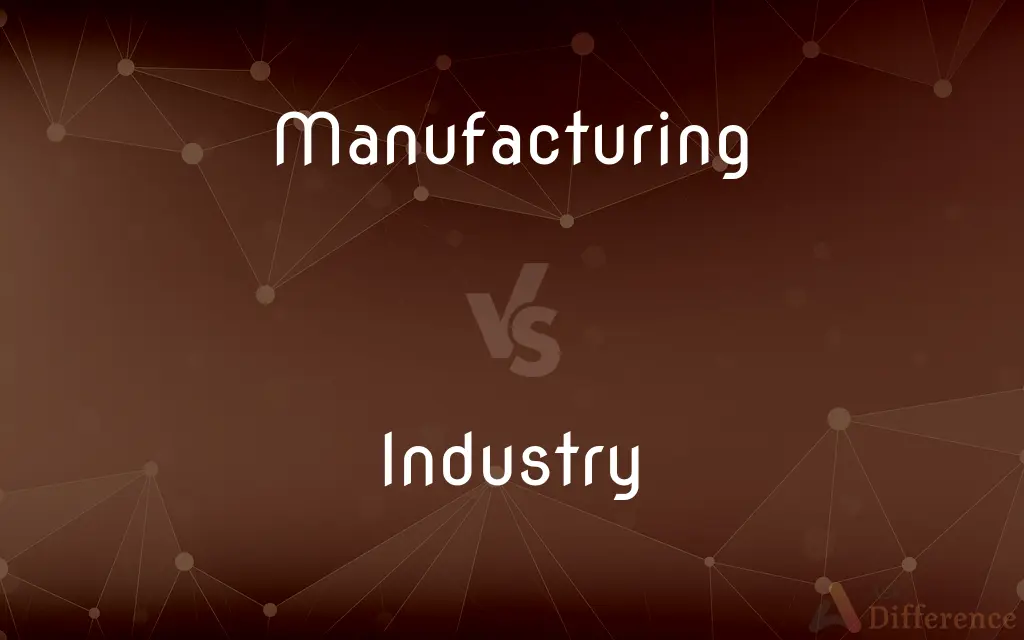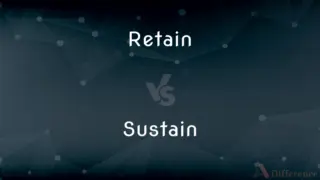Manufacturing vs. Industry — What's the Difference?
By Tayyaba Rehman — Updated on September 26, 2023
Manufacturing is the process of converting raw materials into finished goods, while Industry refers to a specific branch of economic or commercial activity, like the textile industry. They differ in scope and application.

Difference Between Manufacturing and Industry
Table of Contents
ADVERTISEMENT
Key Differences
Manufacturing and Industry are closely related concepts but differ in their scope and significance. Manufacturing specifically refers to the process of producing goods by converting raw materials into finished products, typically on a large scale. It involves various operations like designing, machining, and assembling. In contrast, Industry is a broader term, referring to various sectors of economic activity that can encompass manufacturing but also includes services, agriculture, and other economic activities.
Manufacturing is an integral part of the industrial sector, serving as the driving force behind the production of goods. It’s often associated with factories, machinery, and industrial workers, focusing primarily on the creation of tangible products. Industry, however, can refer to any organized economic activity, and it is categorized into different sectors, such as the service industry, manufacturing industry, and agricultural industry, each with distinct characteristics and functions.
Manufacturing processes are essential for the development and sustenance of industries. They facilitate the transformation of raw materials into goods that can meet the demands of consumers. Without manufacturing, industries would struggle to produce the goods and services necessary for economic growth and development. However, Industry is more encompassing, serving as an umbrella term for various sectors and activities that contribute to the economy, including but not limited to manufacturing.
Manufacturing typically requires a combination of human labor, machinery, and technology to produce goods efficiently and on a large scale. It is a critical component in the value chain of industries, adding value to raw materials by transforming them into products ready for consumption. Conversely, Industry represents a collection of companies and activities involved in producing a specific type of goods or services, impacting economic structures and employment opportunities within regions or countries.
In summary, while manufacturing is focused on the process of producing goods from raw materials, industry is a broader term representing various sectors of economic activity, including manufacturing. The former is a crucial element within the industrial sector, enabling the production of goods, while the latter is an encompassing term for all organized economic activity, spanning multiple sectors and fields.
ADVERTISEMENT
Comparison Chart
Definition
Process of converting raw materials into finished products
Any organized economic activity focused on goods and services production
Scope
Focused on the production of goods
Broad, encompassing multiple sectors and activities
Economic Role
Critical component in the value chain, adds value to raw materials
Umbrella term for various economic activities contributing to economic growth and development
Types
Specific processes like assembling, machining
Different sectors like service, manufacturing, and agriculture
Focus
Creation of tangible products
Producing specific types of goods or services, impacting economic structures and employment
Compare with Definitions
Manufacturing
The large-scale production of goods by industry.
The city is known for the manufacturing of high-quality furniture.
Industry
Collection of entities and activities focused on a particular area of production or service.
The film industry has seen a rapid evolution with the advent of digital technology.
Manufacturing
A sequence of operations involving design, fabrication, and finishing.
Efficient manufacturing processes are crucial for the competitiveness of companies.
Industry
A specific branch of economic or commercial activity.
The technology industry has been booming for the last two decades.
Manufacturing
The process of converting raw materials into finished goods.
Manufacturing automobiles requires a combination of skilled labor and advanced machinery.
Industry
Organized economic activity related to production and manufacturing of goods or provision of services.
The service industry plays a pivotal role in the country’s economy.
Manufacturing
The creation of products suitable for use from raw or unfinished materials.
Advanced technology has streamlined manufacturing processes, reducing production times.
Industry
A sector of the economy made up of manufacturing, services, or agricultural activities.
The automotive industry has been investing heavily in electric vehicle technology.
Manufacturing
Manufacturing is the production of goods through the use of labor, machines, tools, and chemical or biological processing or formulation. It is the essence of secondary sector of the economy.
Industry
Economic activity concerned with the processing of raw materials and manufacture of goods in factories
New investment incentives for British industry
Manufacturing
To make or process (a raw material) into a finished product, especially by means of a large-scale industrial operation.
Industry
Hard work
The kitchen became a hive of industry
Manufacturing
To make or process (a product), especially with the use of industrial machines.
Industry
The sector of an economy made up of manufacturing enterprises
Government regulation of industry.
Manufacturing
To create, produce, or turn out in a mechanical manner
"His books seem to have been manufactured rather than composed" (Dwight Macdonald).
Industry
A sector of an economy
The advertising industry.
Manufacturing
To concoct or invent; fabricate
Manufacture an excuse.
Industry
Energetic devotion to a task or an endeavor; diligence
Demonstrated great intelligence and industry as a prosecutor.
Manufacturing
To make or process goods, especially in large quantities and by means of industrial machines.
Industry
Ongoing work or study associated with a specified subject or figure
The Civil War industry.
The Hemingway industry.
Manufacturing
The act, craft, or process of manufacturing products, especially on a large scale.
Industry
A collection of artifacts or tools made from a specified material
A Mesolithic bone industry.
Manufacturing
An industry in which mechanical power and machinery are employed.
Industry
A standardized tradition of toolmaking associated with a specified tool or culture
A stone hand-axe industry.
The Acheulian industry.
Manufacturing
A product that is manufactured.
Industry
(Obsolete) Cleverness or skill.
Manufacturing
The making or producing of something.
Industry
(uncountable) The tendency to work persistently. Diligence.
Over the years, their industry and business sense made them wealthy.
Manufacturing
The transformation of raw materials into finished products, usually on a large scale.
Industry
Businesses of the same type, considered as a whole. Trade.
The software and tourism industries continue to grow, while the steel industry remains troubled.
The steel industry has long used blast furnaces to smelt iron.
Manufacturing
The industry in which such products are made.
Industry
Businesses that produce goods as opposed to services.
Manufacturing
Used in manufacturing.
Industry
The sector of the economy consisting of large-scale enterprises.
There used to be a lot of industry around here, but now the economy depends on tourism.
Manufacturing
Present participle of manufacture
Industry
Automated production of material goods.
Manufacturing
Employed, or chiefly employed, in manufacture; as, a manufacturing community; a manufacturing town.
Industry
(archaeology) A typological classification of stone tools, associated with a technocomplex.
Manufacturing
Pertaining to manufacture; as, manufacturing projects.
Industry
Habitual diligence in any employment or pursuit, either bodily or mental; steady attention to business; assiduity; - opposed to sloth and idleness; as, industry pays debts, while idleness or despair will increase them.
We are more industrious than our forefathers, because in the present times the funds destined for the maintenance of industry are much greater in proportion to those which are likely to be employed in the maintenance of idleness, than they were two or three centuries ago.
Manufacturing
The transformation of components into finished products ready for sale.
The manufacturing of electronic devices requires precision and attention to detail.
Industry
Any department or branch of art, occupation, or business; especially, one which employs much labor and capital and is a distinct branch of trade; as, the sugar industry; the iron industry; the cotton industry.
Industry
Human exertion of any kind employed for the creation of value, and regarded by some as a species of capital or wealth; labor.
Industry
The people or companies engaged in a particular kind of commercial enterprise;
Each industry has its own trade publications
Industry
The organized action of making of goods and services for sale;
American industry is making increased use of computers to control production
Industry
Persevering determination to perform a task;
His diligence won him quick promotions
Frugality and industry are still regarded as virtues
Industry
The overall production of goods, services, agricultural or other professional activities within an economy.
The textile industry remains a major source of employment in several countries.
Common Curiosities
Can the term industry refer to service-based sectors?
Yes, industry can refer to any organized economic activity, including service-based sectors.
Is manufacturing only related to goods?
Yes, manufacturing specifically relates to the production of tangible goods.
Can industry refer to agriculture as well?
Yes, agriculture is considered a primary industry in economic classifications.
Does the term industry always relate to commercial activities?
Primarily, but it can also encompass non-profit activities within its broader definition.
Does manufacturing always involve large-scale production?
Typically, but it can also refer to smaller-scale production depending on the context.
Is technology essential for modern manufacturing?
Yes, technology plays a crucial role in optimizing and innovating manufacturing processes.
Is manufacturing a subset of industry?
Yes, manufacturing is a specific sector within the broader concept of industry.
Can manufacturing exist without industry?
No, manufacturing is inherently a part of industry, representing a specific sector of industrial activity.
Does manufacturing add value to raw materials?
Yes, it transforms raw materials into finished products, adding value in the process.
Can industry be used to refer to the overall economic production of a country?
Yes, it can represent the sum of all economic activities within a country or region.
Can there be an industry without manufacturing?
Yes, industries can exist focusing on services, agriculture, or other economic activities without involving manufacturing.
Can the term industry be used to refer to professional activities?
Yes, industry can encompass various professional activities, both commercial and non-commercial.
Does manufacturing require specialized skills and machinery?
Typically, yes. Manufacturing usually involves specialized knowledge, skills, and machinery to produce goods efficiently.
Is every company a part of an industry?
Yes, every company operates within a specific industry or multiple industries, contributing to economic activities.
Is the term manufacturing used interchangeably with industry?
While related, they are not interchangeable; manufacturing is a specific activity within the broader concept of industry.
Share Your Discovery

Previous Comparison
Retain vs. Sustain
Next Comparison
John vs. JonAuthor Spotlight
Written by
Tayyaba RehmanTayyaba Rehman is a distinguished writer, currently serving as a primary contributor to askdifference.com. As a researcher in semantics and etymology, Tayyaba's passion for the complexity of languages and their distinctions has found a perfect home on the platform. Tayyaba delves into the intricacies of language, distinguishing between commonly confused words and phrases, thereby providing clarity for readers worldwide.
















































